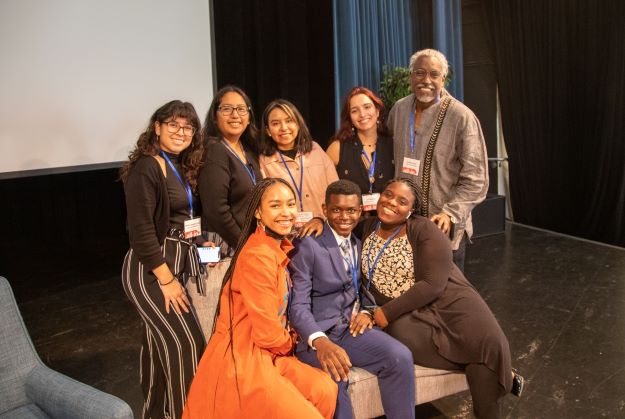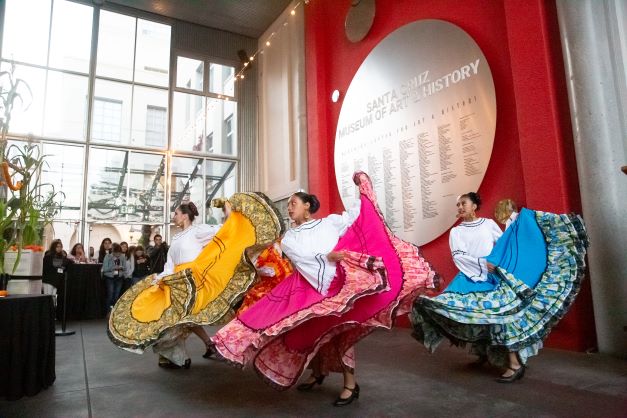Campus News
Scholars, students, and community working together for transformation at UCSC’s All-In Conference
More than 400 university scholars, students, community organizers, foundation representatives, artists, and activists came together in late October for a one-of-a-kind event to build collaborative partnerships for community-engaged research and meaningful social change at the UC Santa Cruz conference: All-In: Co-creating Knowledge for Justice.


More than 400 university scholars, students, community organizers, foundation representatives, artists, and activists came together in late October for a one-of-a-kind event to build collaborative partnerships for community-engaged research and meaningful social change at the UC Santa Cruz conference: All-In: Co-creating Knowledge for Justice. The event was co-presented by UCSC’s Institute for Social Transformation (IST) and Urban Research Network and co-sponsored by a broad range of foundations, community organizations, and partners on and off campus.
All-In, which was held from Oct. 26-28, 2022, at multiple locations around Santa Cruz, included five plenary sessions, 87 presentations across 42 breakout sessions, a poster session, numerous spoken word performances, including by Sacramento Area Youth Speaks (SAYS), Monterey County Poet Laureate Daniel Summerhill, and Fong Tran, and a screening of the award-winning film “Fruits of Labor.” There was also a reception at the Santa Cruz Museum of Art & History (MAH) with cultural performances by Senderos Centeotl Danza y Baile folkloric dance group.
“This was not your traditional academic conference,” said Chris Benner, professor of environmental studies and sociology and faculty director for IST. “Right now, we face a crisis of racial and economic inequality, climate change, democracy, and undermining faith in political solutions; this requires all of us to collaborate. Sharing strategies to expand and deepen the co-production of knowledge will help us tackle these pressing social issues.”
All-In centered on the idea of critical community-engaged scholarship, an action-oriented, equitable collaboration towards achieving structural change and social justice. The goal is to build stronger relationships between universities and the communities they serve by addressing issues of power and equity and deeply engaging undergraduate students.
According to Benner, All-In demonstrated that the university is well-positioned to be a leader and convener for like-minded higher education institutions across California interested in community-engaged scholarship. Grassroots organizations like the ACCE Institute say they can see the value.
“We want to ask people from the universities to come out of the university and into the community first to listen, and then to help us really understand what they [the universities] are missing,” said Christina Livingston, ACCE’s executive director during the All-In closing plenary session. “There is real wisdom and knowledge that the community members hold, but we don’t know everything.”
The conference also marked the debut of the new Campus + Community initiative, led by Rebecca London, associate professor of sociology.
“We now have a web of engaged scholarship that reaches across disciplines, throughout our campus, and into our various communities,” London said during the opening plenary session.
According to many who attended, the conference inspired participants with the range of ideas and examples for effective university-community partnerships and energized by the possibilities of co-creating systemic change for justice.
All-In was initially scheduled to be held in March 2020 but was canceled abruptly due to the COVID-19 pandemic. The organizers wanted to keep the conversation going in the interim, so they hosted a series of virtual events in 2021 to encourage conversation and collaboration. But this year’s event was the first opportunity for All-In to meet in person.
“Colleges and universities seem to have discovered community engagement and the importance of raising their visibility off campus, rolling out new programs like service learning, and touting scholarship opportunities that serve the public good,” said Steve McKay, associate professor of sociology and director of the UCSC Center for Labor Studies, who presented at the conference. “But such loose definitions of the ‘public good’ can sometimes lead to a kind of shallowness that may sound nice and does not cost much, but also does not strike at the heart of inequality or injustice.”
Many at the All-In conference aspired to do even more.
“We want to push this budding movement beyond ‘performative engagement’ – that is beyond slogans and colorful banners with ‘diverse’ faces and community handshakes,” said McKay. “Critical community engagement means not settling for ‘public good,’ but working for the ‘public better.’”
Want to learn more? Check out the complete recap of the All-In Conference on the IST website.